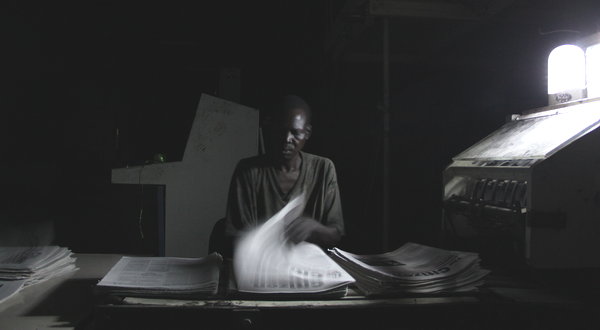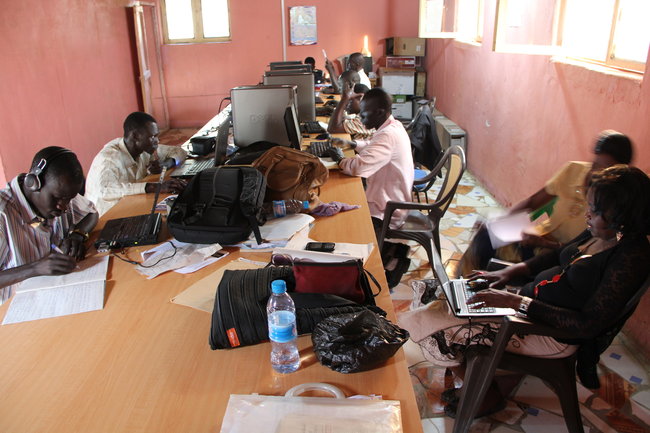
OVERVIEW
MANAGEMENT
PERFORMANCE
POSSIBILITIES
CAPITALS
ACTIVITIES
ACTORS
BURGESS
Media, Society and Economy |
|
COMMENTARY This is a story about the media struggle in South Sudan ... a new country in Africa. People involved with media in Africa have to face difficulties as the powerful try to control the media. We do not hear about similar struggles in Europe and the United States ... but they exist and have different form. It osught to be worrying how much of the media landscape is owned by wealthy corporations individuals with 'agendas' that may or may not be in the public interest.
I am not going to profess any great expertise in the area of media and journalism ... but I am somewhat experienced in the issues associated with transparency, accountability and corruption. The iceberg is huge!
|
|
In a Fledgling County, Perils for the Press
In a thatched hut in Juba, the capital of South Sudan, about 10 young men and women sat on lawn chairs made of brown plastic. They loudly typed on the computer keyboards on the tables in front of them. Two fans were blowing heavily. But the loud humming, which turned all speaking in the room into yelling, didn’t come from them. It came from the backyard, and when it suddenly stopped, the young people saved their work. Minutes later their screens turned dark.
It was hours to deadline for The Citizen, until recently the only daily print newspaper in South Sudan, and its staff had to wait until the generator was refueled. Making a newspaper anywhere these days is not easy; making a daily newspaper in South Sudan can seem nearly impossible. The country is twice the size of Arizona and 80 percent of its roughly 10 million people are illiterate. Power losses, a scarcity of paved roads, scattershot Internet access and increasing tribal violence make it that much harder. And yet since its founding in 2005 The Citizen hasn’t let down its readers a single day. But now the paper faces another challenge in the form of a new military leadership — one not always hospitable to a free press — running the world’s youngest state, one that gained independence only this year. On a morning in mid-November, a reporter named Ater Garang Ariath entered the news hut where two of his colleagues were discussing the day’s events. The editor in chief, Nhial Bol, was elsewhere. He had other things to do: the paper’s supplier of newsprint had stopped supplying it, so The Citizen had to decrease its circulation to 2,000 copies from 6,000. That day, Mr. Ariath, 27, covered a dialogue forum for representatives of the South Sudanese media and national security services. He walked the mile to the event, since there was no bus stop nearby and a boda-boda, or motorbike taxi, was too expensive for him. Mr. Ariath said he made about 900 South Sudanese pounds a month, around $300. He has to write up to 40 articles for that and supports his family with the money. Mr. Ariath began his career as a reporter at the paper of his refugee camp in neighboring Uganda. There is no one at The Citizen whose life hasn’t been affected by the war. Another reporter, Joseph Lagu Jackson, was a former child soldier and learned how to use an AK-47 at the age of 8; the news editor received death threats from the Arab rulers in the north when he was a radio journalist. Though Mr. Ariath is very proud to work for one of the country’s most popular papers, he said the 16-page, English-language tabloid needed more editors. It is full of mistakes and typos, sometimes in the banner headline on the front page. Many reporters are not fluent in English. Mr. Ariath also said the paper needed more color. “In our pictures, Obama is white,” he said. Since independence on July 9, several newspapers have been newly established in South Sudan. The country’s new constitution guarantees freedom of the press. But currently, that freedom is in jeopardy. In October, another South Sudanese newspaper, The Destiny, ran a column that described the marriage of President Salva Kiir Mayardit’s daughter as unpatriotic because she had married an Ethiopian. The columnist and the editor in chief were arrested by the National Security Services and held in prison for two weeks. The Destiny was shut down. President Kiir later said the arrests were justified. The Destiny had tried to become South Sudan’s second daily. A few weeks later in December, Alfred Taban, a former BBC correspondent in Khartoum, started the Juba Monitor which is now South Sudan’s second English daily. Mr. Taban’s Khartoum Monitor was banned by the Arab rulers along with five other South Sudanese owned newspapers printed in Khartoum when the south became independent. The Juba Monitor is also printed at The Citizen which is the only newspaper with a printing machine in South Sudan. At the dialogue forum for the media and security services, both sides were called on to get along with each other. But the event didn’t seem to ease tensions. A spokesman for the Sudan People’s Liberation Army, or S.P.L.A. as the new country’s army is more popularly known, told reporters what they could cover and what would be risky for them — a list that included covering the army, for example. Philip Chol, a spokesman for military intelligence, said: “If you’re a responsible journalist, you will do something that is applicable to the country.” Many reporters got angry. “The recent actions are actually the ones we suffered from in Khartoum,” said Mr. Taban, addressing the case of The Destiny. “I mean we’re trying to establish a democracy here.” Many of the reporters who had come to the event said they had had bad experiences with the new military leaders who now ruled the country after years of oppression by the regime in the north. Mr. Ariath said when he once wrote about an official’s business deals, he got a phone call. If the paper ran the article, the person at the other end said, Mr. Ariath would get into trouble. The Citizen ran the article. Mr. Ariath was not arrested, but the editor in chief, Mr. Bol, was. Mr. Bol has been arrested three times since 2007 by South Sudanese authorities for articles that accused officials of corruption and mismanagement. At 1 a.m., well after the writing and editing in The Citizen’s newsroom was done, four young men sat in the pale light of battery-powered halogen lamps inside the printing house next door. Listening to a smartphone playing Arabic folk music, they folded fresh copies of the newspaper by hand because the old German press couldn’t fold them automatically. At dawn, Juba’s paperboys lined up in front of The Citizen. Some of them read the paper. Mr. Ariath’s article made it to the front page — with no misplaced letter in the headline, just a comma: “Deputy Minister Calls for Security, Media Cooperation.” A version of this article appeared in print on January 9, 2012, |
|
By BENNO MUCHLER ... New York Times
Published: January 8, 2012 |
| The text being discussed is available at http://www.nytimes.com/2012/01/09/business/media/in-south-sudan-a-rough-start-to-press-freedom.html?ref=media |


